

Define: Open Access Overview. Peter Suber First put online June 21, 2004.
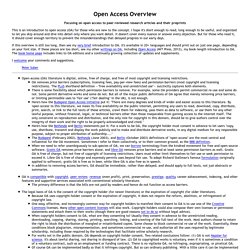
Last revised December 5, 2015. Suggested short URL for this page = Peter Suber Director, Harvard Office for Scholarly CommunicationDirector, Harvard Open Access ProjectFaculty Fellow, Berkman Center for Internet & Society Senior Researcher, Scholarly Publishing and Academic Resources CoalitionResearch Professor of Philosophy, Earlham Collegepeter.suber@gmail.com This overview is also available in Chinese (October 2011), Czech (December 2013), French (September 2012), German (September 2011), Greek (February 2012), Japanese (January 2013), Polish (July 2015), Romanian (September 2012), Russian (January 2012), Slovenian (July 2005), Spanish (March 2012), and Swahili (December 2015).
Comparing Formats for Video Digitization. The following is a guest post by Carl Fleischhauer, a Digital Initiatives Project Manager in the Office of Strategic Initiatives.
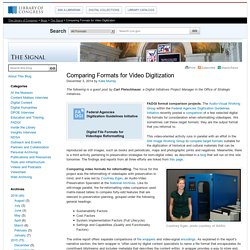
FADGI format comparison projects. The Audio-Visual Working Group within the Federal Agencies Digitization Guidelines Initiative recently posted a comparison of a few selected digital file formats for consideration when reformatting videotapes. We sometimes call these target formats: they are the output format that you reformat to. VideoAtRisk SECTION108 Guidelines 2013. Teaching Copyright.
Free Stuff. Technology cases. Ebooks and articles. Fair Use. Images, charts, infographics. Journal: Driscoll Open Their Eyes: How the Openjournal: Driscoll, Margaret A.
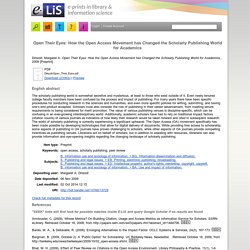
SHERPA/RoMEO - Publisher copyright policies & self-archiving. Know Your Copy Rights. Welcome to Know Your Copy Rights…a Web site for librarians who are developing positive educational programs for academic users of copyrighted materials in US not-for-profit institutions.
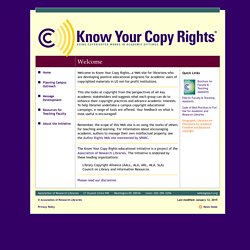
This site looks at copyright from the perspectives of all key academic stakeholders and suggests what each group can do to enhance their copyright practices and advance academic interests. To help libraries undertake a campus copyright educational campaign, a range of tools are offered. Your feedback on what is most useful is encouraged! Remember, the scope of this Web site is on using the works of others for teaching and learning. For information about encouraging academic authors to manage their own intellectual property, see the Author Rights Web site maintained by SPARC.
The Know Your Copy Rights educational initiative is a project of the Association of Research Libraries. Copyright Basics for Musicians - Music Copyright Law. Entertainment Law March 2009 By Jon M.
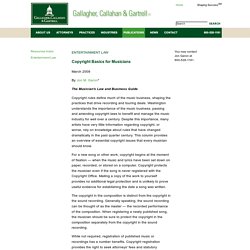
Garon* The Musician's Law and Business Guide Copyright rules define much of the music business, shaping the practices that drive recording and touring deals. EFF The 2012 DMCA Rulemaking: Last week the Librarian of Congress issued his final decision (pdf) limiting copyright owners’ ability to sue you for making full use of the works you buy.
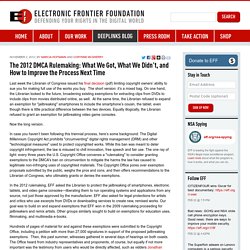
The short version: it’s a mixed bag. On one hand, the Librarian looked to the future, broadening existing exemptions for extracting clips from DVDs to include clips from movies distributed online, as well. At the same time, the Librarian refused to expand an exemption for "jailbreaking" smartphones to include the smartphone’s cousin, the tablet, even though there is little practical difference between the two devices. Equally illogically, the Librarian refused to grant an exemption for jailbreaking video game consoles. Now the long version. In case you haven’t been following this triennial process, here’s some background: The Digital Millennium Copyright Act prohibits "circumventing" digital rights management (DRM) and other "technological measures" used to protect copyrighted works.
E lis under review. DMCA Exemptions. Guest Post by Jan Boyles It’s time to protect the hard-won fair use rights that artists, professors, librarians and online video makers won three years ago at the Copyright Office.
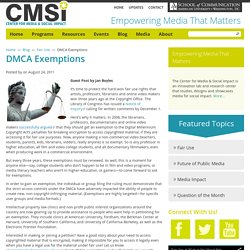
The Library of Congress has issued a Notice of Inquiry calling for written comments by December 1. Here's why it matters. In 2008, the librarians, professors, documentarians and online video makers successfully argued that they should get an exemption to the Digital Millennium Copyright Act’s penalties for breaking encryption to access copyrighted material, if they are accessing it for fair use purposes.
Now, anyone making a non-commercial video (teachers, students, parents, kids, librarians, vidders, really anyone) is so exempt. A Short Guide To Open-Source And Similar Licenses. Advertisement Many developers and designers want to release their work into the world as open-source projects.
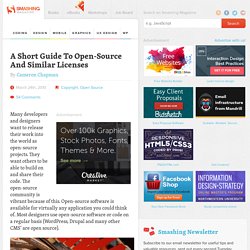
They want others to be able to build on and share their code. Copyright Clearance Center. The Surprising History of Copyright and The Promise of a Post-Copyright World. (Translations: 中文, Italiano, Polski, latviešu valoda.
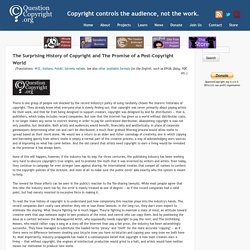
Law of the United States.